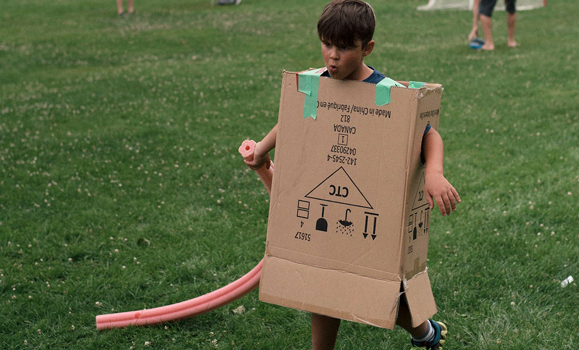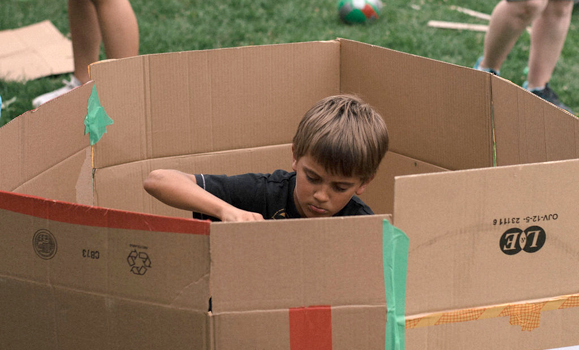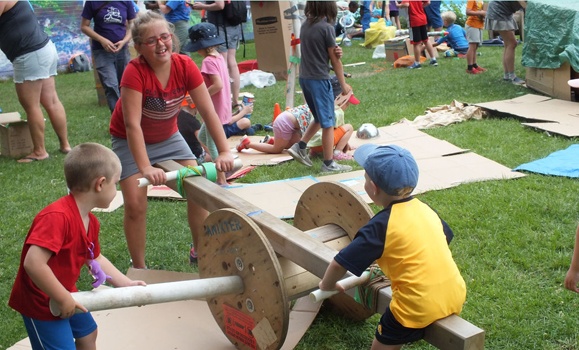Should parents let their children play with boxes, buckets, tarps and lumber? The research says yes, for a variety of important reasons related to their growth, happiness, and overall health.
Researchers in the Faculty of Health’s School of Health and Human Performance and Healthy Populations Institute have created the  named for their the “Physical Literacy in the Early Years” project. Its goal: to spread the message about the value of children’s unstructured play with moveable materials (“loose parts”), and to equip parents, educators, and the public with the understanding of how to support outdoor play – with its risks – to optimize children’s development.
The Summer of PLEY is a series of five free public events spanning three weeks in July and August that focuses on the critical importance of outdoor play in childhood development.
The PLEY project is inviting children, parents, caregivers and professionals from early childhood education, the primary school system, health care, recreation and other backgrounds to participate in events that will share and build on the project’s research findings.Â
Loose parts
The Summer of PLEY kicks off July 22 with a public loose parts pop-up play event happening on the Halifax South Commons (beside the Pavilion) anticipated to attract up to 150 children.

Loose parts are anything that children can move, stack and manipulate independently to create their own fluid play experiences. They frequently include recycled materials such as boxes, milk crates, tires, tarps, dressed lumber and wood scraps, old fabric, cable spools and other materials.
Michelle Stone, assistant professor in the School of Health and Human Performance and associate research scholar in the Healthy Populations Institute, explains that the PLEY research points to the benefits of outdoor loose parts play for the early years while adding to the overall understanding of how significant outdoor play is to children’s development and well-being.
“Nova Scotia researchers are helping to unlock the power of play,” she says. “Our work is part of a growing national body of knowledge that informs policy and can serve as a guide in program development. Ultimately our interests are focused on healthier, happier, more resilient children.”
Panels, play and more
On August 7, the PLEY team will host a panel discussion at the IWK Health Centre, “Building Resilient Children: Injury Prevention in the World of Risky Play,” featuring internationally renowned outdoor play researcher, , in partnership with the Chief Medical Officer of Health for Nova Scotia Dr. Robert Strang, the IWK Child Safety Link and the Atlantic Collaborative on Injury Prevention. Dr. Brussoni, an associate professor in the Department of Pediatrics and the School of Population and Public Health at the University of British Columbia, is frequently interviewed by media to share her expertise, particularly as it relates to children, risk and play.
On August 8, Dr. Brussoni will deliver a keynote address – “Risk, Resilience and the Renaissance of Play” – at HÂţ»â€™s University Club.

The final Summer of PLEY events will be held at the Halifax Central Public Library on August 10, featuring another loose parts play session and a public lecture focused on how to support outdoor play and physical literacy development in early years environments. Educators who participated in the PLEY project will share their experience of integrating loose parts into childcare outdoor play spaces. There will also be a presentation featuring the voices and images of children as they engage in loose parts and nature play.
The Summer of PLEY series is funded by Research Nova Scotia and the HÂţ» Medical Research Foundation. Numerous businesses have donated materials for the loose parts event including Aerobics First, Atlantic Superstore, Canadian Tire, Cobequid Consulting, CycleSmith, MEC, Scotia Tire, SportChek and Walmart. The UK-based assisted with training, and the series is also made possible thanks to its volunteers.
Additional information and resources about outdoor play and the Summer of PLEY series can be found at .

